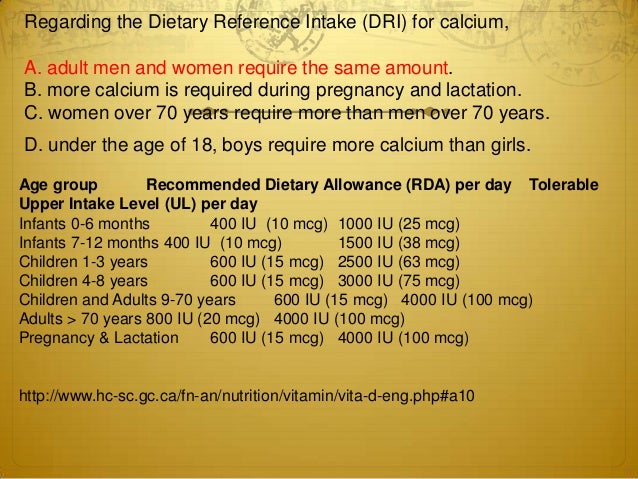Regarding The Dietary Reference Intake For Calcium Quizzn

Based on food intakes only.
Regarding the dietary reference intake for calcium quizzn. Information on calcium intakes is available from dietary intake data collected in the 2004 canadian community health survey cchs. The charge to the committee institute of medicine committee to review dietary reference intakes for vitamin d and calcium was to assess current relevant data and update as appropriate the dris dietary reference intakes for vitamin d and calcium. Older men and women are recommended to take at least 1000 1200 mg day of calcium for bone health and prevention of fractures 1 the average intake in the diet in western countries is 700 900 mg day and lower in asia and africa meaning that most older people would need to take calcium supplements to meet these recommendations.
Adult men and women require the same amount. Women over 70 years require more than men over 70 years. Dietary reference intakes the dris are a family of nutrient reference val ues including the estimated average require for infants adequate intake is 200 mg day for 0 to 6 months of age and 260 mg day for 6 to 12 months of age.
And renders authoritative judgments on the relationships among food intake nutrition and health. 1 which health outcomes are influenced by vitamin d and or. These documents are issued by the food and nutrition board of the institute of medicine national academy of sciences the food and nutrition board addresses issues of safety quality and adequacy of the food supply.
These guidelines for calcium intake have been widely. Dri is the general term for a set of reference values used for planning and assessing the. A new public health report on dietary intake requirements for calcium and vitamin d from the institute of medicine iom released on november 30 2010 updates the iom report of 1997 the three central questions addressed by the report in light of the growing body of research on these nutrients over the past 10 15 yr are.
Establishes principles and guidelines of adequate dietary intake. And calcium in promoting bone health. Adult men and women require the same amount.
More calcium is required during pregnancy and lactation. Regarding the dietary reference intake dri for calcium under the age of 18 boys require more calcium than girls. The review was to include consideration of chronic disease indicators e g reduction in risk of cancer and other non chronic disease.


















